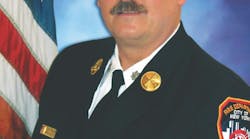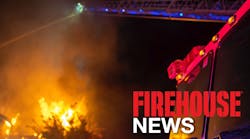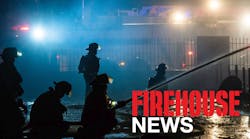Ask any firefighter what some of their primary concerns are and it's doubtful they'll immediately bring up a law first passed by Congress in 1938.
But tell a career firefighter there might be changes in his or her department's overtime policy and you'll immediately get their attention.
The Fair Labor Standards Act was enacted to establish a federal minimum wage and the commonly understood concept that working beyond 40 hours in a week entitles workers to 1 1/2 times the hourly wage.
However, when it comes to firefighters and first responders, the standards and exceptions enacted over the years through subsequent amendments can become tricky and often difficult to understand.
Curt Varone is deputy chief of the Exeter, RI, Fire Department and a retired deputy assistant chief of the fire department in Providence with 44 years in the fire service, but where his wealth of knowledge is best serving firefighters today is on the legal end. Varone, who has also been a practicing attorney for 32 years, spent time at this year's Firehouse Expo in Nashville educating firefighters on the intricacies of the FLSA.
"One of the most likely ways that a fire department can be sued is on the FLSA," Varone said Friday during his FLSA Boot Camp at the Music City Convention Center. "It is the No. 1 most litigated issue in the federal courts right now. It's surpassed race discrimination and sexual harassment."
Even the quickest of web searches for recent settlements can attest to that:
- Houston paramedics won a $72 million overtime judgement in September 2004.
- D.C. firefighters were given $45 million in a lengthy fight over overtime pay in October 2015.
- Lexington, KY, firefighters received $17.7 million in back overtime pay and benefits in May 2017.
- Fairfax, VA, fire captains were awarded $7.85 million in unpaid overtime in December 2016.
What a lot of people fail to realize with the size of these settlements is that the FLSA allows for attorneys fees to be covered. A fire department could owe an employee $1,000 in unpaid overtime, but along with that may come $6,000 to cover the attorneys fees. While a firefighter is simply seeking to recover an amount in lost wages he or she believes won't cripple a budget by itself, the department stands to potentially take a much larger hit.
Varone believes the FLSA has a big impact for firefighters primarily because fighting fire and saving lives is a 24-hour, seven-day-a-week business as opposed to being built around a straight 40-hour work week -- which was the primary concern in the FLSA's passage during the waning years of the Great Depression when the nation's economy was far different than it is today.
Firefighters were not even part of the equation when the law was first passed and didn't fully enter into the scope of it until around 1985.
Most career firefighters are familiar with overtime policy -- beyond 53 hours in a week or 212 in a 28-day period, for example -- and understand how it applies to their particular shift structure. Varone's concerns, though, extend to some of the poorly defined terms within the FLSA, including "regular rate" and the definition of employment written by Congress.
These confusing terms can lead to lawsuits and litigation, but the ambiguity of the language leads to case results that fall over the map.
Varone also sees how a change in the personnel working in local and state government in recent years has brought a private sector approach to budgets. These government bodies often try to leverage the complexity of the FLSA to make drastic budget cuts which adversely affect public safety and leave firefighters little course of action but to file suit.
Whether you agree with the idea of running government like a business, community leaders nonetheless have business school backgrounds and take the approach of cutting costs by any means, which has caused issues with staffing across the country and increased overtime hours for the first responders who remain. Basically, budgets are busting and firefighters nationwide remain understaffed and overworked.
"They have a mindset that they've got to lower costs," said Varone, who added that when he was on the job in Providence, payroll accounted for 93 percent of the department's costs. "That's how a successful business is run is that you have to keep costs at an absolute minimum. ... Personnel is the easiest way to lower costs, and they're willing to roll the dice."
"In the public sector nowadays, folks are only in for a few years and they'll create a problem and it'll be someone else's problem when it's time to correct it."
One of the more interesting aspects of how the FLSA needs to modernize, according to Varone, are the unique aspects of work in the digital age. If a crew closes down a scene and the lieutenant leaves and prefers to go home and finish up the incident report there, is that going to cause any issues when overtime comes into play?
While advances in technology are affording firefighters more and more flexibility in their work and should be embraced in many aspects, the days of simply punching in and out on a clock will soon be somewhat of a memory, a development which has the potential to complicate payroll concerns and draw blurry lines when it comes to determining what is and isn't compensatory labor.
A firefighter knows when he or she is doing their job, but where is the mechanism to log those hours when they're performed in a remote capacity? This is a concept the FLSA in its current form fails to address.
Varone strongly encourages all firefighters, both career and volunteer, to familiarize themselves with FLSA law and protect their own interests when it comes to scheduling and the hours they work. Anyone looking for a wealth of information on legal issues concerning firefighters can check out Varone's fire law blog.
"This is at the forefront of many firefighter's minds and of course many chiefs," he said. "In my opinion, the FLSA impacts the fire service more than any other profession."






